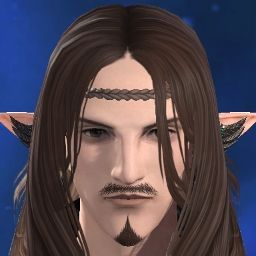Sorry, I kept meaning to reply this, but I don't really seem to have the time for effortposts here that I used to lately.
I guess I was being a bit reductive when I said not to expect them to make Venat a villain; like you point out, I've said in the past the past that that's not even what I want, and just wanted her character to be portrayed as a morally grey figure. In this context, though, I was using 'villain' less as 'someone depicted as morally bad' and more as 'antagonist'. For all I disliked it, Endwalker went so hard on Hydaelyn being heroic and in the right that flipping the framing outright to the Scions all admitting her actions were kinda wrong and a better solution should have been found would create a dissonance in the script, where how the player was signaled to emotionally respond would flip sharply after a relatively short amount of gameplay. That kind of thing is something I'd assume game writers are eager to avoid, since most people have a fairly superficial investment in the plot, making consistency much more important than the actual message.
It's frustrating, but though it feels likely from the interviews and the Omega questline that the Venat arc came out a little strange and absolutist, the only real ways they can respond to that without making a mess of the story is to either 'phase out' the entire question by negating the tension between the canonical tone of the Sundering plot and the actual facts (either by making the Sundering less bad, which they seem averse to, or having the Ancients survive in some way) or to push it into side-content where it won't force established characters to contradict their own positions. I doubt they'll touch Amaurot in the MSQ again in the medium term; maybe eventually we can hope for a proper revisit to it, in the way that ultimately happened with a lot of the beastmen stuff.
It's painful to have to accept the disproportionate nature of the situation, where any addendums still have to exist in deference to the vibe of the major release that just happened. But for the time being, I'm reassured just by the fact that the writers are obviously not married to it.
Like I said, Mide and her boyfriend get the knowledge of Alexander from a time paradox; they don't come up with it themselves, they learn about it from ancient Hotgo lore that in turn comes from them that in turn comes from ancient Hotgo lore... Etc. It's an obnoxious way to do time travel writing, IMO; no better here than in EW's core plot.
You're right that they also get insight from Omega, but that also isn't technology they're coming up with themselves. So again, time travel can't really be framed as an instance of the Sundered being superior to the Unsundered, when what it really comes down to isn't just ingenuity, but knowledge from a specific group of aliens.
-
08-08-2022 06:04 PM #851Player

- Join Date
- Aug 2019
- Posts
- 334
- Character
- Floria Aerinus
- World
- Balmung
- Main Class
- White Mage Lv 80
(7)Last edited by Lurina; 08-08-2022 at 06:10 PM.
-
08-08-2022 10:10 PM #852Player

- Join Date
- Aug 2019
- Posts
- 334
- Character
- Floria Aerinus
- World
- Balmung
- Main Class
- White Mage Lv 80
On the ongoing question here about whether it's acceptable to commit mass-murder if the stakes are life itself in the long-term, I want to - putting aside my earlier comments about my main objection being how it's questionable to write a story like in the first place, especially when said mass-murder is framed as due to some inherent racial characteristic - take a bit of a different tack to Crowny and challenge this idea at its root.
Why, exactly, does potential future life have any fundamental value at all, especially when compared to life that already exists in the here and now? To paraphrase Kant, man is not a means to an end, but an end unto himself; conscious beings do not exist to affirm the world, but are rather its purpose, for nothing has any value except that which is imparted by the perceptions of a conscious observer. Those who are not born are (obviously) not conscious, and so have no inherent value. Therefore, a choice that will result in the world ending in 100 generations as opposed to 100,000 is at worst ethically neutral so long as that ending is not any more unpleasant for the conscious beings that have to experience it, because the only "victims" are unborn, unconscious ones, and in both cases their number is infinite anyway. If we assume the number of unborn beings "saved" by extending the lifespan of the world is, say, a trillion, then the total casualties go from ∞ to ∞ -1 trillion.
...or in other words, still ∞.
And that's if we give the fundamental worth of life the benefit of the doubt, which despite Endwalker's attitude, many philosophers don't. If extending the lifespan of the world would come at the cost of it being much more unpleasant to live in, than arguably not doing so is more ethical because it reduces the level of suffering per conscious being over the course of their lives.
For the sake of argument, let's also set aside all speculation about the Amaurotines finding another solution to the Meteion problem given enough time, and all objections to the story's weird ideas about utopias, and take what Endwalker appears to be saying at face value: Without Venat doing the Sundering, the Unsundered would have carried on as normal for a while, sacrificing some life that may or may not have been sentient to Zodiark in the process, before at some point relatively far in the future either becoming consumed by ennui and committing suicide, or getting killed by the Final Days after the Unsundered Zodiark finally breaks down in the face of Meteion's assault.
Even with this in mind, Venat's action feels incredibly morally wrong to me. It is a choice to indiscriminately sacrifice every currently conscious person against their will (and creating a bunch of essentially new conscious beings in the process), not to protect anyone who actually exists, but purely for the sake of the unborn.
How is this justified? Going past all of my more straightforward problems with the expansion's themes, this aggressive pro-natalism, this idea that the continuation of life has some essential value unto itself beyond the welfare and happiness of those who currently exist, really alienated me. It's frustrating because the text doesn't really engage with the obvious utilitarian counterargument at all. It just asserts repeatedly that the continuation of life is undeniably worthwhile for its own sake and strawmans any opposition as basically a kind of super-depression; perpetuation of life matters more than quality of life, and no matter how much your life is materially awful, you should continue to live anyway because shut up just do it. (Off-topic, but EW left me with an extremely dire sense of how the SE writers could approach topics like assisted suicide or the right to die, though in fairness, it's pretty common for anti-depression stories to fumble in these areas.)
As any individual has the absolute right to contribute to human extinction by choosing not to reproduce, so to does a society have the right to choose the lives of those who are currently alive over potential future life, so long as they're not explicitly damning people to suffer through their actions more than the alternative - as we are by destroying the planet through climate change while continuing to create a huge amount of new humans who'll have to deal with the consequences. Separated from the issue of the sacrifices, I believe the Unsundered had this right, and felt strange about the story's portrayal of this attitude as unacceptable.(10)Last edited by Lurina; 08-09-2022 at 12:30 AM.
-
08-09-2022 01:41 AM #853
-
08-09-2022 01:56 AM #854Player

- Join Date
- Jun 2015
- Location
- Gridinia
- Posts
- 679
- Character
- Malcolm Varanidae
- World
- Marilith
- Main Class
- Lancer Lv 100
Because for a group of people whose entire culture revolved around the betterment of the star and large numbers of that same group gave their lives in an attempt to save said star. You'd think they would be willing to do anything to ensure the star survived, even if they did not. But instead they chose to, just forget and try to go back to what they had. Venat was putting the wellbeing of the star above what most of her people wanted at the time.
(8)
-
08-09-2022 02:27 AM #855Player

- Join Date
- Aug 2019
- Posts
- 334
- Character
- Floria Aerinus
- World
- Balmung
- Main Class
- White Mage Lv 80
You ignored the point I was trying to make to answer a rhetorical question out of context.
Still, I'll reiterate. The 'star' has no independent value because it is not conscious. Living people are the only things with self-justifying worth, as only conscious beings can impart value through experience and observation; without anyone to give a crap about it, the universe and even life itself is just matter doing varyingly complicated stuff.(7)Last edited by Lurina; 08-09-2022 at 02:34 AM.
-
08-09-2022 02:59 AM #856Player

- Join Date
- Aug 2011
- Location
- Limsa Lominsa
- Posts
- 2,216
- Character
- Midi Ajihri
- World
- Hyperion
- Main Class
- Arcanist Lv 100
The term "man" is used in our own day in-game as a general name for the people of Hydaelyn as a whole too.
The poster I quoted seemed to be under the impression that "Amaurotine" wasn't a term that existed when it very clearly does and is used. The people of the ancient times with the powers of creation seem to all be centered around Amaurot. They themselves refer to their people as "Amaurotine". The people in Elpis all have the same clothing and are under the Convocation's jurisdiction so it may be assumed that it's the same deal and Elpis is an integral part of Amaurotine culture and society.
What we don't quite know for sure is how the rest of the ancient world is like outside the city of Amaurot and if they're all the same. It may be inferred through Venat and Azem's travels and snippets about helping people around the world that outside of the main cultural center of Amaurot, people may at least be living differently and have different ideas than the city-folk. We know at least that there are actual farmers living in villages, but we don't know if they're also philosophical god-beings or if they are just mundane farmers.
"Amaurotine" describing a specific group of people beyond just their culture or place of origin isn't without precedence either since the race of people with a third eye and inability to control aether are called Garleans and their city is called Garlemald.
Regardless, it's a term used in-game so I don't know why people would have a problem with it.
In Elpis, the Ancients specifically describe their society as being for the betterment of the star, so they themselves put value into it whether or not it is conscious.
It may very well be that the qualifications of "who or what is worth living" was where Venat's crew and Emet-Selch's crews' opinions diverged. Venat traversed the world much more than Emet-Selch did, after all. I hope we get a Tales from the Dawn to explain this more.(9)Last edited by MikkoAkure; 08-09-2022 at 03:01 AM.
-
08-09-2022 03:23 AM #857
There are things that I, myself, put value in - animal welfare, for instance - that becomes compromised when a situation arises that means those values and other values clash, such as "aversion to human cost and suffering [distinguished, subjectively, on my part, from human convenience.]" I know some people in the case of the Ancients like to jump on that as "see, they're hypocrites and betrayed their own values [and thus they can't complain at being annihilated by Venat]" but it's a natural part of being human and existing in the world, and negotiating with tragedy and complex situations. Ordinarily, I think most people would sympathize with an animal rights activist, or an environmentalist, making the choice to give up on a group of animals if it meant saving a group of humans without accusing them of hypocrisy - unless there's already a pre-established investment or material/emotional benefit in interpreting their choices in a universally negative way.
There is legitimately nothing the Ancients did wrong that we ourselves, as a human society, (correlated with the societies of the Sundered) are not also guilty of. This is much of the core of why the in-narrative and fandom arguments that it's acceptable and good that they were wiped out on the basis of their collective societal "sins" is rather mind-boggling at best - and that's without getting into posturing about how we're somehow "better" or "more resilient" or "not a Dead End" compared to them when the only reason we survived was due to massive amounts of intervention and direct assistance on their part.(9)Last edited by Brinne; 08-09-2022 at 03:25 AM.
-
08-09-2022 03:30 AM #858Player

- Join Date
- Jul 2015
- Location
- Amaurot
- Posts
- 4,449
- Character
- Tristain Archambeau
- World
- Cerberus
- Main Class
- Black Mage Lv 90
I'm curious as to where "Amaurotian" - as opposed to Amaurotine - occurs in game.
(5)When the game's story becomes self-aware:

-
08-09-2022 03:33 AM #859
-
08-09-2022 03:34 AM #860






 Reply With Quote
Reply With Quote








